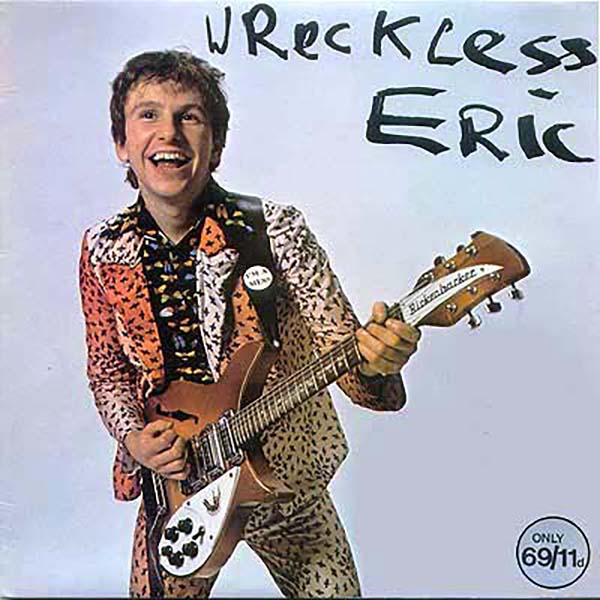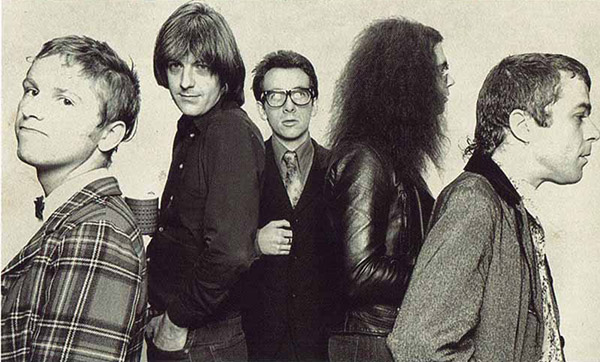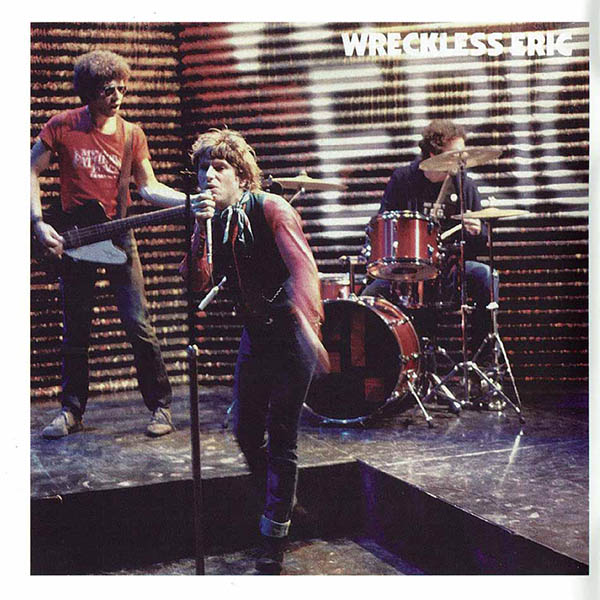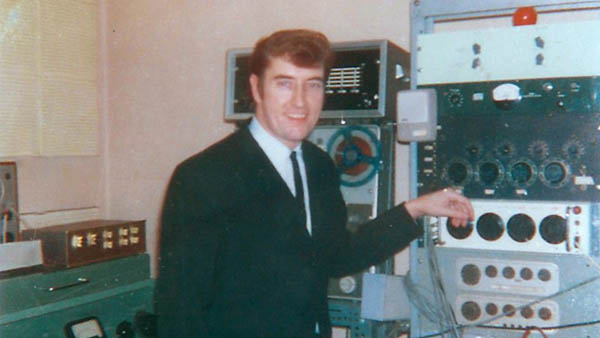 Wreckless Eric. Zac Bonnell photo.
Wreckless Eric. Zac Bonnell photo.
“I will never have anything said against that man!” Eric Goulden, aka Wreckless Eric, is waxing lyrical about a fellow traveller in the English rock’n’roll and pop scene.
You’d be forgiven for thinking Eric might be talking about the late Ian Dury, the iconoclastic poet-cum-musician who provided a rough template for Eric’s own career, or maybe one of the sundry punk rockers who attached themselves to Stiff Records around the same time Eric bounced into popular consciousness with the now classic "Whole World World". Maybe even Joe Strummer? Pete Shelley?
Elton John.
Yep, Elton John.
There is a segue, via The Pretty Things.
As a teenager Eric saw The Pretty Things, on the back of the release of the Pretty’s "SF Sorrow". 25 years later Eric found himself playing rhythm guitar with The Pretty Things, when he joined the band for a few tours in the early 1990s.
“That was a dream come true,” Eric says. When I mention that The Pretty Things have just left Australia for the last time, Eric has an idea. “They should have gone out on a package tour with Elton John. Could you imagine Elton John, backed by The Pretty Things?”
No, I concede with absolute sincerity, I’ve never contemplated such a possibility. But Eric has. And he respects Elton John, too.
“Elton John played with me one night. It was just stunning. He said he would come on, and it got to the point in the set when he said he come on, and I’m thinking ‘Where is he?’ You could tell he was there, these big, blocky piano chords. He was just electric,” Eric says.
“There was a point where we were jamming by the end, we were doing "Sweet Little 16", and he suddenly took a step back, ran at the piano stool, jumped up on the piano stool, jumped clean over the piano, jumped down into the centre of the centre of stage, just started clapping his hands. It was like you could just feel it! I have so much respect for that physical force that was coming off him, it was uncanny!”
Years before Elton took his flying leap across the piano, young Eric Goulden was in Hull, watching Ian Dury front Kilburn and the High Roads, years before Dury got his taste of fame out front of the titular Ian Dury and the Blockheads. The sight of Dury, opinionated and ignoring the partial paralysis caused by his polio, inspired Eric.
 Who's a messy boy, then?
Who's a messy boy, then?
“Ian was so English,” Eric says. “Even Ray Davies had to take a trip to Memphis. We were ruled by America. But Ian was so English. He sang in an English accent, overtly so.
"Ray Davies did sort of, and you could say The Beatles sang in English accents, but they were very trans-Atlantic. But Ian didn’t. He was so British, and his lyrics were British, and that was the truth because we were British.”
The mention of Ian Dury takes Eric down a path of recognition and affection for the late English singer. Notoriously cantankerous, and surprisingly charming to those whom he respected, Dury was, proverbially at least, a towering figure in the mid-1970s English rock’n’roll scene.
“Towards the end of Ian’s life, I used to talk to him about Jarvis Cocker, that he should really meet him. Ian hated everyone until he met them, and then he loved them, and that included Paul McCartney.
"’Yesterday is the sound of sick going down the open sewer’, and then after he’s met McCartney ‘The man is a genius! ‘Yesterday’ is one of the most brilliant pop songs ever written’.
"Ian never met Jarvis Cocker, which is unfortunate, because he did more than we ever could. We wanted to have this kind of English-ness about it, but Jarvis took it to the next level!”
Dury also had the “best timing I’ve ever met of anybody”, Eric enthuses. “He knew how to set the groove up, and he knew where the groove was, and he should us how to do that. He was unable to play an instrument, so he never played any other instrument, apart from drums and percussion, but I think he was a jazz musician.”
In 1976 Eric Goulden sent a cassette recording of a song he’d written, ‘Whole Wide World’, to Stiff Records, the label founded by Dave Robinson and one-time Dr Feelgood tour manager Andrew Jakeman (aka Jake Riviera).
“I’d come to London. I’d been studying art in Hull, and my girlfriend said I couldn’t just rot away in Hull, I had to go to London, get my songs out. When I came to London I couldn’t ever get going, couldn’t find anyone to play with. Then I heard about Stiff Records and heard [Nick Lowe’s] ‘Heart of the City’ on the radio. It was like the underground all over again. It seemed so home made, it seemed to be my thing.”
There are conflicting stories of what happened next – one version has Riviera rejecting it, until Goulden played it directly, another has Riviera loving it the first time he heard it), but eventually Goulden’s track stuck, and Stiff agreed to include the song on a compilation released in April 1977, "A Bunch of Stiff Records".
 What a bunch of Stiffs: Eric, Nick Lowe, Elvis Costello, Larry Wallis and Ian Dury. Tour promo shot.
What a bunch of Stiffs: Eric, Nick Lowe, Elvis Costello, Larry Wallis and Ian Dury. Tour promo shot.
“People said I couldn’t sing, and I had no confidence as a singer,” Goulden says. “I got the job as singer in the band because I had the loudest voice. But Nick Lowe said my voice sounded great coming out of the transistor radio. You have a voice that’s made for the transistor radio – which was the currency of the time.”
Later that year Goulden found himself on a Stiff package tour, headlined by Ian Dury and Elvis Costello. The tension between Dury and Costello was palpable.
“The two of them, they both wanted to get somewhere,” Goulden says. “With Elvis, I’d never seen such naked ambition. I found him quite disturbing, I didn’t feel comfortable around him. Ian had finally seen his chance. He was 35, which was old in those days. He’d been struggling for years, and now he was going to take it. So there were two driven people on that tour, Ian and Elvis. The rest of us were living the ramshackle dream, off our faces and I suppose wasting our opportunities.”

Also on that fateful tour was Nick Lowe, who’d championed and then produced Wreckless Eric’s now classic single ‘Whole Wide World’. “He was a huge influence on that first record,” Goulden says. “It was a small team on that record. I didn’t know much about recordings before we did that record, in fact I didn’t know much about recording studios at all. You couldn’t even find a picture of a recording studio! I was so absolutely over awed when I went in there.”
‘Whole Wide World’ was a success and subsequently released as a single. But by 1980 Stiff was running dry. Jake Riviera had left the label in 1978 and Goulden, now known universally by his moniker Wreckless Eric, was losing his enthusiasm for the label. In 1980 Goulden flew out to Australia for what would become his last tour with Stiff Records and his last trip to Australia for 38 years.
“When I came back from Australia and New Zealand, I was thinking ‘What am I doing?’ Stiff Records had changed from this very down home, ramshackle, DIY thing to a very successful label,” Goulden says.
“It was the most important record label in the world for a short time. It was the independent label, and there had been nothing like it, not as successful as Stiff Records did. It was almost like we’d got into the basement of a building that was the music industry and we were dismantling it from inside. But suddenly it was different. All the people we were laughing at, and who we were subverting, were working for the label.
"There were label managers, the head of marketing, the head of A&R, stuff like that. There was nothing like that at Stiff Records when it started. Stiff Records went from being the label that put out The Pink Fairies to the label that put out Tracey Ulman doing ‘Breakway’! Suddenly it was all about videos. It wasn’t what I signed up to.”
Goulden broke his own ties with Stiff and entered the 1980s determined to rediscover his DIY roots. The 1980s was a turbulent, and relatively lean time. Goulden formed a succession of bands: The Len Bright Combo and The Captains of Industry. Goulden wasn’t in the best physical or mental health, and by the late 1980s he’d re-located to France.
“I got sober at the end of 1980s, and I thought that was the end of the problem but it turned out to be the beginning of the problem,” Goulden says. “I never trusted anyone in the music industry, I had been fucked over by record companies, publishers, managers. So I went completely underground. But it wasn’t the worst thing because most of my career I’d operated with no record label, no manager. I just wanted to just make the music.”
At the height of his disillusionment with the music industry Goulden contemplated leaving the music industry altogether. But the pull of music was too strong. “I said I couldn’t keep making music. But eventually I realised I could, and I wanted to. People told me to get a job, but I was a man on a mission. There were times when I could have given up – I had no money, I was playing to no people, I was selling no records, I was just below the poverty line but I kept going because it was the thing I wanted to do. I might have been deluded, but that delusion belied my complete and utter lack of confidence.”
Nineteen years after moving to France, Goulden moved back to England. “My long-term girlfriend of the time told me I was getting better while I was in France,” Goulden says. “I got my thoughts in order, got my money in order. Ian Dury once said ‘If you look after your talent, your talent will look after you’. And that’s what I started to do. Just keep playing, recording and writing. Then I came back and carried on. By then I was able to cope with people.”
During his time living in Francem Goulden released "The Donovan of Trash", which included the single ‘Joe Meek’, a tribute to talented and troubled English producer of the 1960s.
 Joe Meek.
Joe Meek.
“He was definitely an inspiration,” Goulden says. “He used to record in this flat in north London, and I was obsessed with the fact that he didn’t need to be in a recording studio. But they sound so much better, somehow. People give me their demos, then six months later I hear the album, and I think ‘Where has the magic gone?’ If only you could capture the magic that was there on that first demo. That’s what Joe Meek did.”
By end of the noughties Goulden had relocated to the United States, where he still lives with his partner, singer-songwriter Amy Rigby. Goulden now his own studio in New York, where he continues to work and record.
“I’ve got my own place here, and people are always surprised at how small it is. But I always try and make people who come here feel good, feel comfortable about what they want to do,” Goulden says. “Because that wasn’t my experience when I went into studios. Producers and engineers could make you less than you should be.”
In November Goulden returns to Australia for the first time since his final tour with Stiff Records, way back in 1980.
“I should imagine I’m looking forward to the weather,” Goulden laughs when I was ask him what he’s looking forward to seeing when he lands back on Australian tour. “When I went to Australia the first time, I only knew two weeks before, when I was in America. No-one had bothered to tell me!
"I get the impression that Australians have much more confidence than they did back then. A lot has come out of Australia since then. It will be incredible to see how it’s changed. And I’ve got a lot of friends who’ve ended up in Australia. And it’s the only place in the world that I can make a comeback!”
NOVEMBER
07 WELLINGTON NZ San Fran Tickets
08 CHRISTCHURCH NZ Blue Smoke Tickets
09 AUCKLAND NZ Tuning Fork Tickets
11 MELBOURNE The Tote Tickets
14 ADELAIDE The Gov Tickets
15 SYDNEY Factory Theatre Tickets
16 SYDNEY Petersham Bowls Tickets
17 HARDY’S BAY Hardy’s Bay Club Tickets
18 CANBERRA The Basement Tickets
22 BRISBANE The Triffid Tickets
23 CASTLEMAINE Theatre Royal Tickets
24 MELBOURNE Northcote Social Club (matinee) Tickets
24 MELBOURNE Caravan Club Tickets
26 PERTH The Rosemount Tickets

